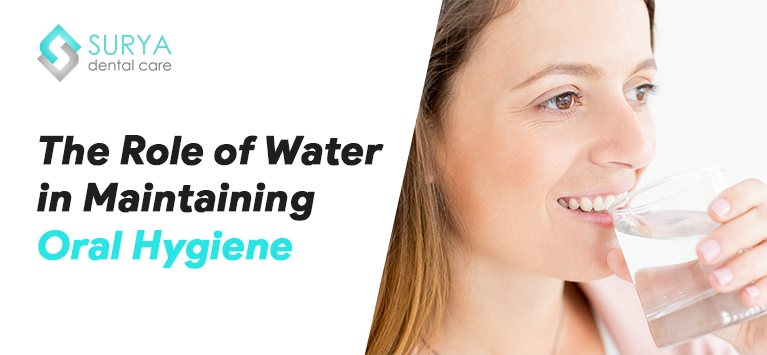We all know that water is essential for life, but did you know it is also vital for oral health? Drinking enough water can help you prevent many oral problems, such as bad breath, cavities, gum diseases, and oral cancer. Water also supports your overall well-being, as your oral health is connected to your general health. In this blog post, we will explore how drinking water can benefit your oral health and the best ways to drink water for your teeth and gums.

How does water help your oral health?
Water has many positive effects on your oral health, such as:
- Strengthening your teeth and enamel: Water contains fluoride, which is a natural mineral that strengthens your tooth enamel and protects it from decay. According to the CDC, drinking fluoridated water can reduce cavities by about 25% in children and adults. Water also helps remineralize your enamel, which can be eroded by acids and bacteria in your mouth.
- Washing away the bad stuff: Water is an excellent mouth cleaner, as it washes away leftover food and residue that can feed the harmful bacteria in your mouth. These bacteria produce acids that can damage your enamel and cause cavities. Water also dilutes the acids and helps neutralize them. Drinking water after eating or drinking sugary or acidic foods and beverages can help prevent tooth decay.
- Improving your gum health: Water can help prevent gum disease, a chronic inflammation of your gums caused by plaque and tartar buildup. Gum disease can lead to bleeding, swelling, receding gums, tooth loss, and an increased risk of other health problems. Water can help keep your gums hydrated, clean, and healthy by reducing inflammation and plaque levels. According to a study, drinking more water was associated with a lower risk of gum disease.
- Protecting against oral cancer: Water can help prevent the malignant growth of cells in your mouth that can affect your lips, tongue, cheeks, throat, or palate. Oral cancer is often linked to risk factors such as tobacco use, alcohol consumption, or chronic inflammation. Water can help protect against oral cancer by modulating your immune system, inducing cell death of cancer cells, and inhibiting the growth of cancer-causing bacteria.
How much water should you drink for your oral health?
The amount of water you should drink for oral health depends on various factors, such as age, weight, activity level, climate, and health conditions. However, a general guideline is to drink at least eight glasses of water per day or about two liters. This can help you stay hydrated and support your oral and overall health.
However, drinking too much water can also have adverse effects, such as diluting electrolytes, causing water intoxication, or interfering with kidney function. Therefore, you should only drink what your body needs and listen to your thirst signals. You can also check the color of your urine, which should be pale yellow or clear, to see if you drink enough water.
What are the best ways to drink water for your oral health?

Not all water is the same, and some ways of drinking water are better for oral health than others. Here are some tips on how to drink water for your oral health:
Choose tap water over bottled water:
Tap water is usually fluoridated, which means it contains fluoride that can strengthen your teeth and prevent cavities. Bottled water, on the other hand, may not have fluoride or may have less than the optimal level. Bottled water may also have contaminants, such as microplastics, that can harm your health.
Therefore, it is better to drink tap water for your oral health unless your tap water is unsafe or has a sour taste or smell. You can also use a filter to improve the quality of your tap water, but make sure it does not remove the fluoride. However, having large amounts of fluoride can cause damage.
Drink water throughout the day:
Drinking water throughout the day can help keep your mouth moist, clean, and healthy. It can also help you avoid dry mouth, which is a condition that makes it hard to swallow and chew because of a lack of saliva. Saliva is your mouth’s natural defense against bacteria, and it helps wash away food particles, neutralize acids, and remineralize your enamel.
Dry mouth can increase your risk of cavities, gum disease, bad breath, and oral infections. Drinking water frequently can help prevent dry mouth and stimulate saliva production.
Drink water after meals and snacks:
Drinking water afterward can help rinse any food or drink residue that can stick to your teeth and cause decay. It can also help wash away any sugar or acid damaging your enamel. Drinking water after eating or drinking can also help prevent staining of your teeth, especially if you consume foods or beverages that can discolor your teeth, such as coffee, tea, wine, or berries. Drinking water can also help freshen your breath and prevent bad breath.
Avoid adding sugar or flavoring to your water:
Adding sugar or flavoring to your water can make it more appealing but also harm your oral health. Sugar can feed the bacteria in your mouth and cause cavities, while flavoring can add acid to erode your enamel.
If you want to add flavor to your water, you can use natural ingredients, such as lemon, cucumber, mint, or berries, but drink plain water afterward to rinse away any acid or residue. You can also chew sugar-free gum or brush your teeth after drinking flavored water to protect your teeth.
Take away:
Drinking water daily helps us stay hydrated and protects our teeth from dental problems, improving our overall health. We should make this awareness a part of our daily routine, as it can help us achieve healthier and brighter smiles. Drinking water is a simple and effective way to care for our oral health and general well-being. So, let’s toast to a hydrated and healthy oral future—with every sip we take.



